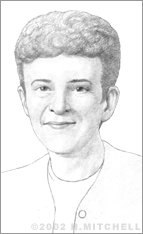Irene Greif
Computer scientist Irene Greif is one of a growing group of American women making important contributions in a typically male-dominated field. Greif, who was a mathematics standout at Hunter College High School in New York as a teenager, was the first woman to earn a doctorate in electrical engineering and computer science from the Massachusetts Institute of Technology (MIT) in 1975. She has also served as a faculty member there, appointed in 1982 as a principal research scientist. She headed up a research group in MIT’s Laboratory for Computer Science to develop shared calendar, coauthoring, and real-time collaboration systems.
In 1987, Greif joined Lotus Development Corp. in Cambridge, Mass. In 1992, she formed the Lotus Research Group and has been credited with helping to create a “world-class research and development organization” at the company. She became known as an expert in how people work with computers and how people can work with each other using computers.
Colleagues have said that she brought a more user-friendly perspective to the field, bringing social scientists and computer scientists together for the first time, in a forum that had never existed before. She is the founder of the field of Computer-Supported Cooperative Work (CSCW), the science of interaction between people and their machines. This new field serves as the basis for groupware such as Lotus Notes, one of the industry's groundbreaking e-mail and collaboration software products. In 1988, she edited "Computer-Supported Cooperative Work, A Book of Readings," the first book in the field.
Among the innovative products that Grief and her team developed at Lotus are the Version Manager for 1-2-3, a feature that launched the group-enabling of all Lotus products; InterNotes Web Publisher, a precursor to the Domino program; the first Palm Pilot conduit for Notes mail; the Sametime system, which is Lotus’ real-time communications product; and a design vision for reinventing email. Lotus was acquired by IBM in 1995, and shortly thereafter, Greif became the fourth woman ever named an IBM fellow. Six other women have since received that honor.
Greif has been recognized for her work with a number of awards and honors. She is a fellow of both the Association for the Advancement of Science (AAAS) and the Association of Computing Machinery (ACM), and in 2000, she was inducted into the Women In Technology International (WITI) Hall of Fame. She is a wife and mother who has said, “You can have a family or whatever else you want to mix into your life. You make trade-offs. I can’t say I always got it right, but I can say that I thought it through.”


